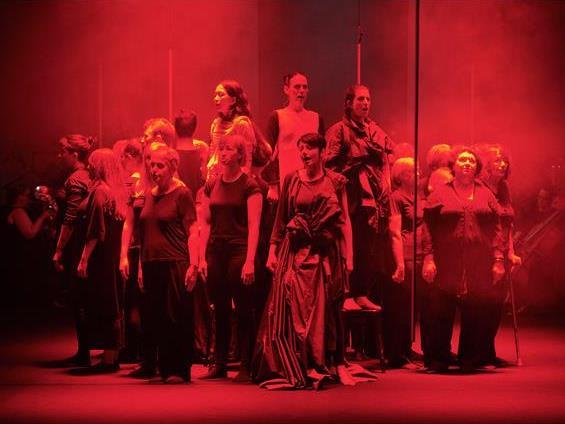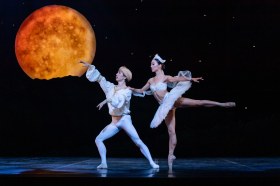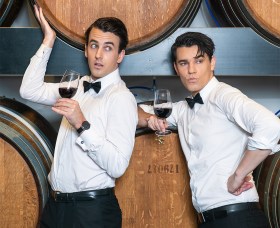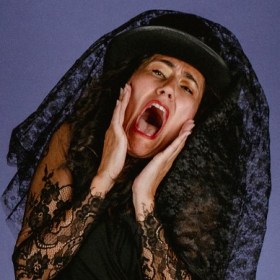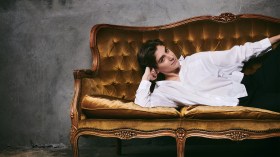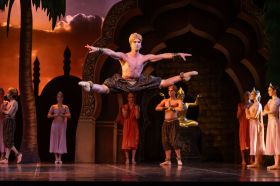A scene from Cat Hope’s 2019 opera, Speechless. Photo credit: Frances Andrijich.
As reported by Alison Croggon in Opera and the invisibility of women, the New Opera Workshop (NOW2019) held in Brisbane in April highlighted the entrenched bias, the structural nature of sexism and other exclusionary forces that are reflected in many of the norms, expectations and practices of opera as an artform.
The conference was an invitation to practitioners to evolve new thinking for opera in the 21st century and it is in this spirit that we – and our co-signatories below – are making a call for change.
NOW is the time for the opera sector to step up and join the conversation about gender equity, diversity and the championing of a multiplicity of voices. On the brink of redefining the Major Performing Arts Framework and in the wake of the National Opera Review Discussion Paper and Final Report, we ask that these points be urgently addressed. Now is the time for opera in Australia to evolve and to lead the way with diversity on our stages, in our creative teams, and on our panels. We are calling for a better vision for opera in its work practices and as an art form.
We demand a national commitment to systemic change:
- We want diversity to be reflected in all aspects of the opera we experience.
- We call for a questioning of the systemic acceptance of gender-based violence in opera.
- We want recognition, respect, advocacy and support for creators who are female, non-binary and from diverse cultural backgrounds.
- We call for safe inclusive spaces for people with diverse voices and abilities to set the agenda, to lead the conversation, to have a resonant voice.
- We want to decolonise the distribution of power so that the stories and creative work of women and all people with diverse voices resonate equally with that of men.
- We call for an unprecedented commitment to the programming and commissioning of new Australian opera work with gender and cultural diversity at the forefront.
- We call for those in leadership to back us and that the act of hearing be prioritised alongside the act of speaking.
NOW2019 revealed the importance of paying attention to how conferences and workshops are organised in terms of who curates and facilitates the sharing of ideas, what spaces are used, what language is employed, who is invited to speak, who is supported and profiled, and how we all lose out when curation only reverberates a single voice. NOW2019 forces us to question whose voices are valued, who sets the agenda and to what end. It has sparked impassioned and ongoing discussion amongst many of the female cohort who were present around the urgency of platforming a diversity of voices in order to enrich the conversation and provide positive ways forward for the art form.
Creating a more inclusive future
To quote composer and music copyist Peggy Polias, we believe that ‘It’s not enough to say “we’re looking to the future” and be completely oblivious to the conversations taking place around identity, representation and privilege.’
She said, ‘I want to see everyone in the industry who considers it their responsibility to innovate or transform the art world to accept their share of the burden of making change and educating themselves, not just relying on marginalised groups, or in this case women, to do it for them.’
We believe we all have a responsibility to our artists and our public to produce operatic works that engage with these contemporary conversations, to tell relevant stories which resonate across our diverse spectrum of audiences, and program artists whose work deserves to be experienced. We want to see the burden of representational change shouldered across the industry as one of the benchmarks of innovation.
Laura Bowler’s work-in-progress about rape, Laura Sings was presented at NOW2019 accompanied by the artist’s trigger warning whereas other operas dealing with this topic composed by male composers didn’t offer any such framing. The presence of a female telling of such sensitive subject matter in this context served to highlight the unthinking default mode of opera as synonymous with the violation of women. There was no trigger warning for the other operas because acts of sexual and physical violence against women are culturally accepted and often glorified as an essential and ‘appropriate’ dramaturgical component of the ‘love, passion and desire’ that are the stock-in-trade of opera.
The unthinking default mode of opera [is] synonymous with the violation of women.
A questioning of the systemic acceptance of gender-based violence is something we feel must be emphasised in the discussion of opera moving forward as a relevant art form and in line with cultural and social responsibility in the #metoo era.
It is a fact that Australia has a disturbingly high rate of violence against women and that gender inequality is at the core of the problem. On average one woman a week is murdered by a current or former partner; one in three Australian women have experienced physical violence since the age of 15; one in five Australian women has experienced sexual violence. This urgent social crisis needs to be taken into consideration in programming of the operatic canon and the making of new operatic work.
As creators and curators of opera in contemporary Australia we must constantly interrogate what we are placing on stage and question why we are telling this story, in this way, today.
The stories we choose to tell, who is telling them, and how we choose to tell them is of fundamental importance. The perception of women in opera as subservient victims remains at odds with the contemporary conversation.
A SHARED AGENDA
The framing of women’s voices and stories is essential, and the trust, support and timeliness of men to step aside and let women take up the microphone is critical. We would like to see a new norm. A shared agenda. A diversity of voices sharing a plethora of perspectives. We want to see ‘us’ in the stories, share the role of storytelling, and have greater input into the way these stories are told.
This call is about values around respecting all voices and giving space and time for those voices to reveal themselves. Enough is enough. Let’s champion women at all stages of their lives and careers. Let’s commit to a diversity of voices on our stages and behind the scenes. Let’s open up this privileged space, share the power, act out of generosity, and lead by example.
We are calling on all women and men in opera to continue this conversation. We are only some of the voices in opera today and we do not presume to have all the answers. But we have witnessed the deep-seated frustrations and the toll that exclusion takes on the field in terms of wasted talents and lost cultural richness. We know that the need for change is urgent. This is the start of a conversation and we want to stand with you, together, to make real systemic revolution in opera today.
List of co-signatories: (gathered 11-12 May 2019)
Cathy Milliken, composer
Imara Savage, director
Claire Edwardes, Artistic Director, Ensemble Offspring
Tamara Saulwick, Artistic Director, Chamber Made
Georgia Scott, composer
Josephine Macken, composer
Annie Hui-Hsin Hsieh, composer
Professor Cat Hope, composer and academic
Professor Emerita Anne Boyd AM, composer
Damien Ricketson, composer
Paul Smith, Artistic Director, Blush Opera
Deborah Cheetham AO, Artistic Director, Short Black Opera Company
Esther Anatolitis, Executive Director, National Association of the Visual Arts
Laura Bowler, composer and vocalist (UK)
Patricia Sykes, poet and librettist
Tamara Kohler, Co-Artistic Director of Rubiks Collective
Zsuzsanna (Zsuzsi) Soboslay, director, writer, performer
Jessica Wells, composer, Director of Jigsaw Music
Allison Bell, singer
Kate Moore, composer
Lisa Cheney, composer
Olga Neuwirth, composer (Austria)
Louise Devenish, musician
Kate Milligan, composer
Dr Pia Palme, composer and academic (Austria)
Gabriella Smart, pianist, Artistic Director, Soundstream
Eugene Ughetti, Artistic Director, Speak Percussion
Jessica O’Donoghue, singer
Brenda Gifford, composer
Rachael Dease, composer
Kate Neal, composer
Kaylie Melville, Co-Artistic Director of Rubiks Collective
Cynthia Troup, writer and editor
Elizabeth Jigalin, composer
Sarah Elise Thompson, composer
Samantha Wolf, composer
Alexis Weaver, composer
Alice Chance, composer
Vickie Tran, Co-Director of Sonant Bodies
Jacob Abela, pianist/keyboardist, composer, Rubiks Collective
Niki Johnson, percussionist, Ensemble MUSE
Claudia Jelic, clarinettist, Ensemble MUSE
Rachel Drubetsky, Artistic Director of Ensemble MUSE
Jess Scott, flutist, Ensemble MUSE
Katarina Grobler, pianist, Ensemble MUSE
Tina Stefanou, composer/visual artist
Anne Cawrse, composer
Jaslyn Robertson, composer
Felicity Wilcox, composer
Hilary Kleinig, composer & cellist, Zephyr Quartet
Ian Whitney, composer
Clemence Williams, Chamber Pot Opera
Adena Jacobs, director
Lawrence English, composer/curator Room40
Alison Croggon, writer/librettist
Sarah Penicka-Smith, conductor
Melanie Penicka-Smith, producer
Eve Klein, vocalist/composer
Nate Gilkes, director
Sheah Sutton, Executive Producer, Speak Percussion
Alicia Cush, Co-Artistic Director, Little Match Productions
Penny Challen, Co-Artistic Director, Little Match Productions
Evan Lawson, Artistic Director, Forest Collective
Rinske Ginsberg, academic
Lore Lixenberg, singer (UK)
Jessica Aszodi, singer, Co-director of Resonant Bodies (Australia/UK)
Arlene Sierra, composer (USA)
Heloise Werner, singer (UK)
Diana Soh, composer (France)
Ruth Mariner, director (UK)
Jessica Cottis, conductor (Australia/UK)
Sally Whitwell, pianist/composer
Melody Eotvos, composer
Christine Douglas, founding Artistic Director, Pacific Opera
Megan Steller, artist manager and writer
Moya Henderson, composer
Organisations that have committed to release a statement outlining the steps they will take to achieving systemic change in opera, in response to the above call for action:
Sydney Chamber Opera, Artistic Director Jack Symonds
Added since publication:
Kate Millett, Co-founder and Artistic Director BK Opera
James Penn, Co-founder and Conductor BK Opera
Suzanne Chaundy, director, Co-covenor Melbourne Independent Opera Coaliton & Lyric Opera Board
Heather Fairbairn, director
Katia Beaugeais, composer / saxophonist
Thomas De Angelis, co-creator Chamber Pot Opera
Jack Symonds, composer
Daniel Thorpe, composer
Nancy Black, Artistic Director, Black Hole Theatre
Daniel Portelli, composer
Erica Fryberg, artist management
Pierce Wilcox, librettist
Chikako Morishita, composer
Dianna Nixon, Artistic Director, Wild Voices Music Theatre
Marion Aubert, playwright, librettist (France)
Allegra Giagu, Artistic Director and CEO, Mamás Bravas
Juliana Hodkinson, composer
Professor Vanessa Tomlinson, academic, composer/performer
Taana Rose, composer
Danielle Maas, dramaturg
David Chisholm, founding Artistic Director and CEO, Bendigo International Festival of Exploratory Music
Vanessa Chapple, director
Aaron Carpene, Artistic Director, FROLIC (Fine Rendition Operatic and Lyrical Intercultural Collaboration)
Leslie Martin. vocalist, creative producer Success On Stage
Janice Muller, director
Judith Dodsworth – singer/ educator
Andy Packer, Artistic Director, Slingsby
May Lyon, composer
Peter Knight, Artistic Director, Australian Art Orchestra
Irene Sarrinikolaou, singer, Artistic Director Angel Voices
Jakob Bragg, composer
Dakotah Love, vocal student
Eva Varga, student classical voice
Esin Gunduz, composer, vocal performer
Joseph Franklin, composer/bassist
John Davis, CEO Australian Music Centre
Nicole Beyer, Executive Director, Theatre Network Australia
Thea Derks, music journalist (Amsterdam)
Emma Jayakumar, composer, Artistic Director Lark Chamber Opera
Anna Cordingley, designer
Leticia Caceres, director
Margery Smith, composer
Laila Engle, Co-Artistic Director Syzygy Ensemble
Catherine Campbell, singer, actor, director, educator
Ali McGregor, singer, Artistic Director, producer
Joanne Kee, Executive Producer, National Theatre of Parramatta
Adam Goodburn, performer, writer, producer (SINGular Productions)
Natasha Anderson, composer
Andrée Greenwell composer, Artistic Director Green Room Music
Vanessa Chapple, Chair, Australian Women Directors Alliance
Marlene Claudine Radice, composer
James Hazel, composer & sound artist
Elizabeth Sheppard, composer
Rhys Little, composition student, member Konzertprojekt
Keyna Wilkins, composer
Ruth Strutt, singer, Ruth Strutt Music Studio
Catherine Grant, musician/academic
Natalie Christie Peluso, singer
Akiko Yamane, composer (Japan)
Gabrielle Cadenhead, composition student, co-founder Konzertprojekt
Rob Melbourne, composer, Artistic Director Noosa Music
Alex Raupach, General Manager Canberra International Music Festival
Roland Peelman, Artistic Director Canberra International Music Festival
Paul McMahon, singer and academic
David Pledger, artist, curator
Anna Tregloan, designer, artist, curator
Elliott Gyger, composer
Sean Quinn, composer
Sarah Carradine, director, writer
Danielle O’Keefe, Artistic Director The House That Dan Built
Adam Simmons, musician, artist, teacher
Goldele Rayment, director
Evie Pikler, singer
Louise Howlett, Artistic Director, ReAction Theatre.
Sally Richardson, director, writer Steamworks Arts
Fiona Hill, composer
Karen Cummings, singer
K. Travers Eira, composer
Rosalind Appleby, writer
Andrew Aronowicz, composer
Stephanie Kabanyana, composer
Gillian Wills, writer
Kristen Baum, film composer (USA)
Stephen Adams, composer and music media producer
Miriama Young, composer
Jaidyn Chong, composer
Elizabeth Kerr, music writer and critic (NZ)
Julie Robson (Ladyfinger), performance maker
Gillian Whitehead, composer
Ann McLean, independent arts manager
Suzon Fuks, artist and curator
Elaine Chia, CEO City Recital Hall
Beth Yahp, writer
Hannah Reardon-Smith, flautist, composer, conductor
Patricia Alessandrini, composer, sound artist (France/USA)
Wendy Richman, violist (USA)
Matthew Lorenzon, writer
Phoebe Green, violinist
Nat Grant, sound artist
Julian Day, artist, composer and writer/broadcaster
Julia Moreno Perri, music composer, creative maker (USA)
Marshall McGuire, Director of Programming Melbourne Recital Centre, & harpist
Jeanell Carrigan, pianist, orchestrator, educator
Kelly Lovelady, conductor, Artistic Director Ruthless Jabiru (UK)
Glenda Keam, composer, President International Society for Contemporary Music (ISCM)
Camellia Koo, designer (Canada)
Natalie Rewa, writer (Canada)
Davida Tkach, lighting designer (USA)
Mary Birnbaum, director (USA)
Ashlie Corcoran, director, Artistic Director Arts Club Theatre company (Canada)
Vernay Dabney, singer (USA)
Jaime Martino, Executive Director, Tapestry Opera (Canada)
Kim Whitener, Founding Co-Director, Prototype Festival (USA)
Allison Tyra, librettist, Millennial Opera
Yasmin Arkinstall, singer
Lindy Hume, director, Artistic Director Ten Days on the Island
Linda Thompson, CEO -Artistic Director, Gertrude Opera, Yarra Valley Opera Festival
Brooke Green, musician, composer, music producer
Katharina Rosenberger, composer (USA/Switzerland)
Tamara Cashour, composer, pianist, soprano, Artistic Director, OperAvant Inc. (USA)
Sarah Becker, Head of Philanthropy, Belvoir St Theatre
Morgan England-Jones, singer
Ciaran Frame, composer, media artist
Judy Pile, composer, singer, teacher, surtitle operator
Daniela Kaleva, Associate Head Research and Scholarship, Australian Institute of Music
To add your name as a co-signatory, please email blackwood.sally@gmail.com
